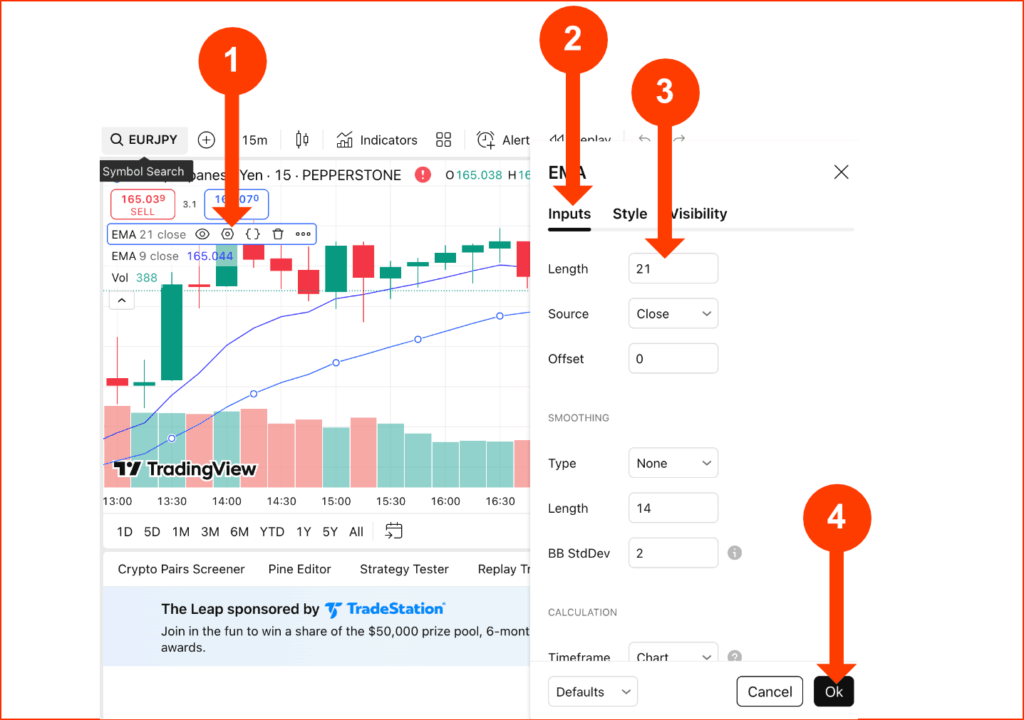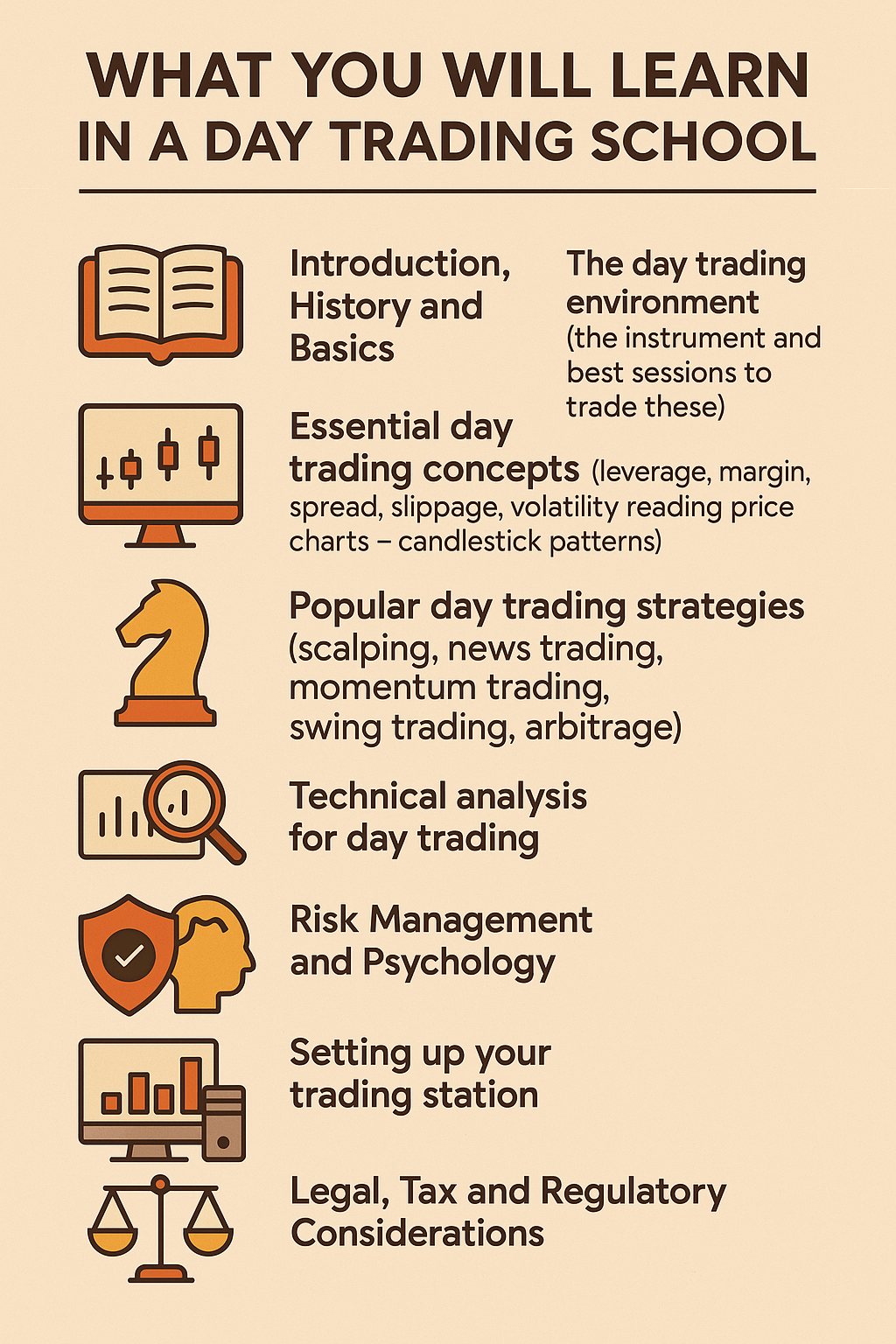
Reputable platforms such as Pepperstone (integrated with powerful charting tools like TradingView), IC Markets, Blackbull Markets, allow beginners to access demo trading accounts. These accounts mimic real market conditions — perfect for practising what you learn in a trading course, without risking real capital upfront.
Many traders coming to the fray of forex and stock trading shy away from day trading as it is viewed as the most obscure way of generating income. This is perhaps one of the most misunderstood forms of trading.
But what is the best day trading course for beginners with a demo account? In simple terms: it’s a structured course that teaches you how to trade stocks or forex within the same day — and lets you practise live strategies on a simulated platform before risking real money.
The truth about day trading is that this can be a fruitful form of trade if the trader has taken committed steps to understanding the principles of how day trading works. This is where a day trading course comes in.
Day trading is an organised discipline of trade and any willing trader can learn how to conduct day trading fruitfully. This debunks the notion that day trading is a form of gambling.
Technology has made it easy for traders to go about the business of day trading, but before you can lay your hands on a day trading software, it will be worth your while to invest in learning the basic principles of day trading.
How to Consistently Make Money Day Trading
Day trading demands more than luck — it requires consistency, risk management, and a trained understanding of price behaviour. A good course breaks down these essential elements in a digestible format, especially for beginners.
The perception that day trading is a fast track to easy money is not only false — it’s dangerous. The truth is, professional day traders follow strict rules, manage their capital wisely, and practise with discipline before going live.
Beginners who take the time to learn day trading through structured courses — and who reinforce those lessons by practising on demo accounts — put themselves in a far better position to succeed. Demo accounts let you test strategies, get comfortable with placing orders, and build confidence without financial exposure.
What Does a Day Trading Course Entail?
The day trading course is a well-organised discipline and, as such, has a well laid out curriculum through which learner traders can acquire critical skills for becoming successful day traders. A day trading course will help you grasp the stocks and market fundamentals.
The course will then take you through technical analysis and all the methods of dissecting the reportage and information supplied by day trading platforms. In this exercise, the trader will learn about trading volumes, chart patterns as well as price movements.
The trader will also learn about some of the common indicators such as resistance, moving average convergence/divergence (MACD), as well as support levels. The day trading course also entails aspects of market volatility, Bollinger Bands and price oscillators.
These are just basic principles that help the trader lay the foundation of one’s trading style. There are many day trading eBooks accessible online as well as free and paid online day trading classes that serious traders can take up and equip themselves for the lucrative day trading business.
Day Trading Courses with Demo Account Access
Almost all reputable online day trading platforms now come with demo trading accounts — including those offered by Pepperstone, IC Markets, Exness, and FP Markets. These simulated accounts enable traders to apply what they’ve learnt in a risk-free, real-time environment.

For example, platforms like TradingView, when integrated with your broker such as Pepperstone, allow you to simulate trades using live data. This is especially helpful for understanding how order execution, stop-loss placement, and price movement really work — without putting actual money on the line.
One notable example is Wall Street Trading, which offers a comprehensive day trading course through its Day Trading Lab. Their training covers a wide range of day trading principles and topics.
The course is broken into a comprehensive 5-day program that includes hands-on demo trading access for learners to test their strategies in real time.
Traders can also consider getting day trading certification from recognised institutions such as ExpertRating [link updated or removed if no longer active], which provides structured testing and credentials for beginner traders looking to solidify their theoretical knowledge.
How to Stop Losing Money in Day Trading
When the day trading principles have been mastered, the day trader needs to have sufficient knowledge and experience before real day trading can be conducted. Spending good time on a demo day trading account will equip the trader with the know-how needed before one can plunge into real trade.
As a day trader, you also need to have good risk capital. This protects the trader against financial ruin and impulsive trading. Out of the merits of a day trading course and practical experience, the trader needs to map out a fruitful strategy of conducting day trades in line with one’s personal goals and objectives.
Avoiding Scams: The Importance of Learning Before You Trade
Online scams have become a serious concern for anyone trying to make money online — and the world of day trading is no exception. While technology and access to markets have improved, scammers have also become more sophisticated. The “make money online” promise is now so overused that it often feels like a broken record.
Almost every corner of the web seems to have rogue marketers churning out pop-ups and ads promising spurious overnight wealth. Because of this, many honest people exploring genuine income streams have given up, overwhelmed by scammy schemes that often outnumber the real opportunities.
Yet, there’s positive news: there are still many legitimate and effective ways to make money online — and stock trading remains one of the most powerful. But this only applies to traders who are equipped with the right knowledge, mindset, and platform access.
How to Make Money Online Selling Stocks
In order to make money selling stocks, you need to be involved in the business of trading stocks — and this means having access to the stock market. To do this, you need the services of a licensed stockbroker.
Fortunately, thanks to the internet, your options are not limited to traditional, in-person brokerages. Whether you’re using a platform like Pepperstone, eToro, or XM Group, you can open a trading account and start learning the ropes from home.
Your starting point should be developing a solid understanding of how buying and selling stocks actually works. Once you’re familiar with the basics, selecting a stockbroker who suits your goals becomes much easier.
Depending on your skill set, risk capital, and preferences, you can choose between low-cost order takers or full-service brokers. For beginners, a full-service broker — or at least one that provides in-depth analysis, demo accounts, and educational tools — is often the safer route. Many traders choose to start with brokers that offer demo trading integrated with TradingView, as it allows hands-on learning using real market data.
Best Online Stock Trading Platforms and Tools for Beginners
Some of the most recommended brokers for beginners — offering demo accounts, education, and intuitive platforms — include:
- Pepperstone (integrates seamlessly with TradingView and MetaTrader platforms)
- IC Markets
- FP Markets
- eToro (great for copy trading and social learning)
- Eightcap
- XM Group
- AvaTrade
- Vantage
These platforms provide online trading education, offer stock and forex demo accounts, and help traders test strategies before committing real money. Whether you’re pursuing forex, indices, or stocks, they serve as gateways for both practice and profit.
Best Day Trading Courses for Beginners (With Demo Accounts)
Before you invest your own capital, consider taking a verified day trading course for beginners — ideally one that includes access to a demo trading account. The best courses will cover:
- Stock and forex fundamentals
- Chart reading and market analysis
- Risk management and emotional discipline
- Order execution and back-testing strategies
Remember, it’s not just about knowing the theory. Practice is essential — and that’s where demo accounts from platforms like Pepperstone and TradingView play a crucial role. They help you gain hands-on experience, refine your strategy, and build trading confidence.
FAQs
What is the number 1 rule of forex or stock trading?
The most important rule when you are now trading real money in a live account is to never risk more than you can afford to lose- having done that – you need to ensure that you are only risking 0.5% to 1% of total live account balance per trade. Successful forex trading is really about solid and consistent risk management.
What is the best strategy for consistent profits in day trading?
While there is silver bullet in forex trading – the strategy for consistent profits in day trading must include technical analysis (price action), risk control, and emotional discipline. Also, back testing your strategy using demo (paper money) accounts will help validate it or illustrate its loopholes.
How do you stop loss in trading?
By using stop-loss orders on every trade and sticking to a clear risk-reward ratio. One of the biggest mistakes newbie traders make is to keep adjusting the stop loss in a losing trade hoping to recover the trade – in most cases the trade is never recovered and in fact more money is lost and in some cases you have accounts completely blown out. So the rule of thumb is that when you set stop loss – respect it – let the losing trade go and protect your account.
Why do 90% of traders lose money?
Jumping into trading with real money trading without any education and mastery, emotional trading, overleveraging, and failure to follow a tried and tested strategy.
Can I make a living from day trading?
Yes — but – and it’s a big BUT – only after taking time and interest to invest in mastering the craft of day trading by educating yourself (signing up for courses, watching YouTube videos, buying and reading books on day trading), mastering, emotional control, mastering consistent risk management, and consistent practice until you have built a tried and tested strategy in demo accounts.
Elias Stroud is a professional forex trader and market analyst with over eight years of experience. His journey began with the common misconception that trading was a get-rich-quick scheme, a path that led to significant early losses. It was this initial failure that forced a pivot towards disciplined, long-term learning and strategy development.
Today, Elias specializes in price action analysis, focusing on identifying high-probability setups without relying on complex indicators. He has cultivated a premium-level trading account, a direct result of his commitment to a structured and professional approach to the markets. Elias is passionate about sharing the actionable insights and foundational principles that helped him transform from a novice to a consistently profitable trader.
For further verification of his professional standing and live trading credentials, please visit the “About Us” page where account confirmation screenshots are provided, along with links to his trusted broker, Pepperstone, and his primary charting platform, TradingView.


